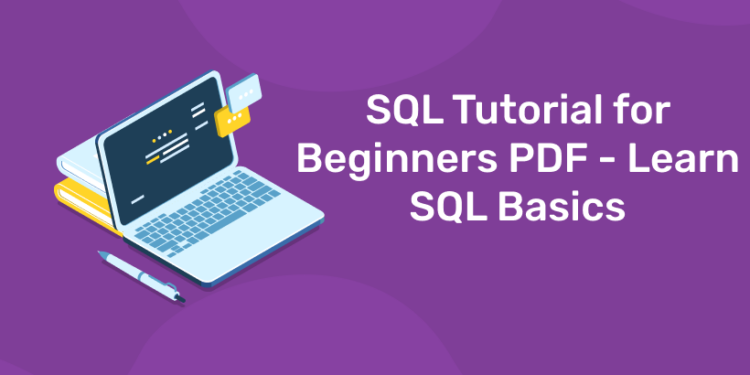Table of Contents
Are you a student looking for a comprehensive guide to learn the basics of SQL? Look no further! Our SQL Tutorial for Beginners PDF is the perfect resource to help you get started. This SQL tutorial for beginners PDF is designed to help you get started with the basics of Structured Query Language. With this comprehensive guide, you’ll be able to understand the fundamentals of SQL quickly and easily and be well on your way to becoming an SQL master. This tutorial provides you with a guide to know the Basics of SQL and equips you with the knowledge and skills needed to get started in the world of databases. So don’t wait any longer, start learning SQL today!
Power up your career with Entri Elevate – Full Stack Development Course!
What is SQL?
SQL, or Structured Query Language, is a domain-specific programming language used for managing data stored in relational database management systems or for stream processing in relational data stream management systems. SQL lets you access and manipulate databases. It is particularly useful for processing structured data, or data that has connections among entities and variables.
SQL Tutorial for Beginners PDF – Free Download
1: Which of the following algorithms is most suitable for classification tasks?
This comprehensive guide covers the basics of SQL syntax, data types, queries, and more. Whether you’re new to databases or just need a refresher, our step-by-step approach and clear explanations make it easy to master SQL. Download our free PDF and start building your SQL skills today!
Check the below PDF to get more details regarding SQL Basics;
What is the potential of SQL?
- SQL is capable of running queries against databases.
- From a database, SQL may obtain information.
- Create new databases using SQL
- A database can have records added using SQL.
- A database’s records can be updated with SQL.
- A database can have records removed using SQL.
- In a database, SQL can generate new tables.
- In a database, SQL can produce stored procedures.
- A database can have views created via SQL.
- Tables, procedures, and views can all have permissions configured via SQL.
Why Learn SQL?
- In the IT sector, SQL is a highly sought-after expertise.
- It is commonly used in corporate intelligence, web development, and data analysis.
- The syntax of SQL is straightforward, making it simple to learn.
Relational Databases
- A collection of tables with links between them makes up a relational database.
- Each table represents a particular entity, such as a client, a good, or an order.
- Relationships like primary keys and foreign keys are used to connect tables.
SQL Syntax
- SQL uses a specific syntax for querying databases.
- A SQL statement is composed of keywords, clauses, and expressions.
- SQL statements are terminated with a semicolon (;)
Power up your career with Entri Elevate – Full Stack Development Course!
What are the components of a SQL System?
SQL Table
The basic component of a relational database is a SQL table. Rows and columns make up the SQL database table. To maximize data storage space, database engineers construct linkages between various database tables.
For example, the database engineer creates a SQL table for products in a store:
| Product ID | Product Name | Color ID |
| 0001 | Mattress | Color 1 |
| 0002 | Pillow | Color 2 |
Then the database engineer links the product table to the color table with the Color ID:
| Color ID | Color Name |
| Color 1 | Blue |
| Color 2 | Red |
SQL Statements
Relational database management systems may comprehend valid SQL statements or SQL queries. Different SQL language components are used by software developers to create SQL statements. The parts that make up a proper SQL statement, such as identifiers, variables, and search conditions, are known as SQL language elements.
Stored Procedures
A group of one or more SQL statements are saved together as stored procedures in a relational database. To increase productivity and performance, software engineers employ stored procedures. For instance, rather than writing the same SQL query in many apps, they may develop a stored procedure to update sales tables.
Are you aspiring for a booming career in IT? If YES, then dive in |
||
Full Stack Developer Course |
Python Programming Course |
Data Science and Machine Learning Course |
How does SQL Work?
The server computer used for SQL implementation conducts the database queries and outputs the results. Several software elements, including the following, are involved in the SQL process.
The parser
The parser begins by replacing some of the words in the SQL statement with unique symbols, a process known as tokenization. The statement is then examined for the following:
Correctness
The parser checks to see if the SQL statement complies with the rules, or SQL semantics, which ensure the query statement’s accuracy. The parser, for instance, looks to see if the SQL instruction terminates with a semicolon. The parser produces an error if the semi-colon is absent.
Authorization
The parser further confirms that the user executing the query has the required permissions to alter the relevant data. The ability to remove data, for instance, might only be available to admin users.
be a full stack developer with entri app ! 100% placement assistance !
Relational Engine
The relational engine, also known as the query processor, develops a strategy for efficiently retrieving, writing, or updating the relevant data. For instance, it looks for queries that are similar to others, employs earlier data manipulation techniques, or develops a new one. Byte code, an intermediate-level representation of the SQL statement, is used to write the plan. To efficiently perform database searches and alterations, relational databases use byte code.
Storage Engine
The software element that interprets the byte code and executes the desired SQL query is known as the storage engine, sometimes known as the database engine. The data in the database files on the actual disc storage is read and stored. The storage engine delivers the outcome to the requesting application after completion.
Power up your career with Entri Elevate – Full Stack Development Course!
| Our Other Courses | ||
| MEP Course | Quantity Surveying Course | Montessori Teachers Training Course |
| Performance Marketing Course | Practical Accounting Course | Yoga Teachers Training Course |











